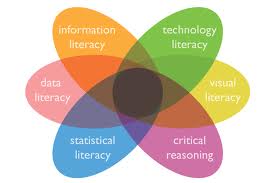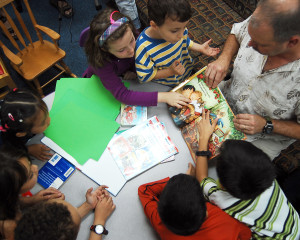 Until the middle of the 20th century, Literacy meant one thing – you could read. It sometimes was modified with the word “functional” to indicate you were capable of reading at a sufficient level to survive in our society. Today Literacy almost never stands by itself – and yet, the important of the basics hasn’t changed .
Until the middle of the 20th century, Literacy meant one thing – you could read. It sometimes was modified with the word “functional” to indicate you were capable of reading at a sufficient level to survive in our society. Today Literacy almost never stands by itself – and yet, the important of the basics hasn’t changed .
Librarians talk of informational literacy and digital literacy. Educators and parents are concerned about financial literacy. With the emphasis on STEM, there is increased reference to numeric or quantitative literacy.
Another important concerns is Transliteracy. It’s defined as “the ability to read, write and interact across a range of platforms, tools and media from signing and orality through handwriting, print, TV, radio and film, to digital social networks.” (www.transliteracy.com). In an age of multiple devices and means of connecting with people and sharing information it is certainly a critical skill.
Those dealing with adults also discuss legal literacy and health literacy. If you have ever tried reading a legal document or dealt with health care policies, the importance of these literacies cannot be denied. Even college graduates find themselves unable to comprehend all the subtleties of how language is used in those areas.
I recognize the importance of all these literacies and support all that is being done to improve the ability of student and adults to master them. However, as a member of ALA Committee on Literacy, I am ever mindful of what was once said at a committee meeting, “The house of literacy has many rooms, but the entrance is through text literacy.”
So we return to where we were in the mid-20th century. First and foremost, we need to be able to read text. And the rate of adult illiteracy is shocking.
In the U.S., 14% of adults over 16 read at or below the 5th grade level, and 29% read at the 8th grade level. The implications are huge. Among those with the lowest literacy rate, 49% live below the poverty level. A substantial portion of our prison population is composed of illiterates or low literates. (ProLiteracy)
 Although school librarians are highly trained to teach the other literacies mentioned, they also are committed to creating lifelong learners and readers by instilling a love of reading. The first Common Belief of the AASL Standards for the 21st-Century Learner is Reading is a window to the world. It then explains, “Reading is a foundational skill for learning, personal growth, and enjoyment.”
Although school librarians are highly trained to teach the other literacies mentioned, they also are committed to creating lifelong learners and readers by instilling a love of reading. The first Common Belief of the AASL Standards for the 21st-Century Learner is Reading is a window to the world. It then explains, “Reading is a foundational skill for learning, personal growth, and enjoyment.”
Students are taught to read in class. For some, the skill is difficult and they are turned off. This is the route to illiteracy and low literacy. In the school library, surrounded by books at all levels, guided by a school librarian, adept at connecting a student with just the right book, students discover that reading can be fun. We need more, not fewer school librarians. The wealth of our nation depends on it.
